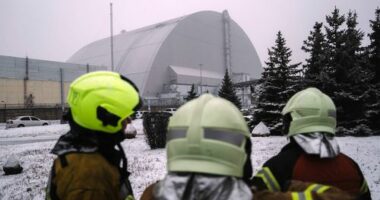Share this @internewscast.com
UK singer Lewis Capaldi has made a heartfelt comeback to the legendary Glastonbury music festival after a two-year hiatus due to Tourette’s syndrome challenges.
Tears and cheers overcame the crowd at Glastonbury when Capaldi walked onto the stage for his surprise performance on the festival’s Pyramid Stage.
It’s the first public concert the singer has performed in two years.

His last performance at Glastonbury in 2023 was disrupted as he was unable to complete his songs because of uncontrollable tics. More than 200,000 attendees then began to sing his lyrics back to him while he watched, emotional, from the stage.
Upon his return today, he again held back tears as the crowd enthusiastically greeted him.
“Glastonbury. It’s so good to be back,” the singer said from the stage.
“I’m not going to say much up here today because if I do, I think I’ll probably start crying.
“But it’s just amazing to be here with you all and I can’t thank you all enough for coming out and coming and seeing me.”

ITV reporter Rishi Davda was in the crowd when he came on stage, telling the Today Show that Capaldi made a triumphant return.
“Seeing Lewis Capaldi’s name appear on the big screen and watching him take the stage was unlike anything I’ve witnessed in many years at Glastonbury Festival,” he stated.
“He sang every song with so much passion, but when he said that first note, you could see he was back doing what he loved.
“That kind of radiated throughout the hundred thousand people potentially, that may have been watching. It was a really, really beautiful moment.”

Capaldi took a two-year break from all public performances following the Glastonbury performance in 2023 to work on his physical and mental health.
His return to the stage was supposed to be a secret, but there were some hints around the festival grounds leading up to the show, including lyrics from his songs plastered on a billboard nearby.
Capaldi has always been open about his struggles with Tourette’s syndrome, a neurological disorder that causes involuntary and repetitive movements and sounds, referred to as tics.












